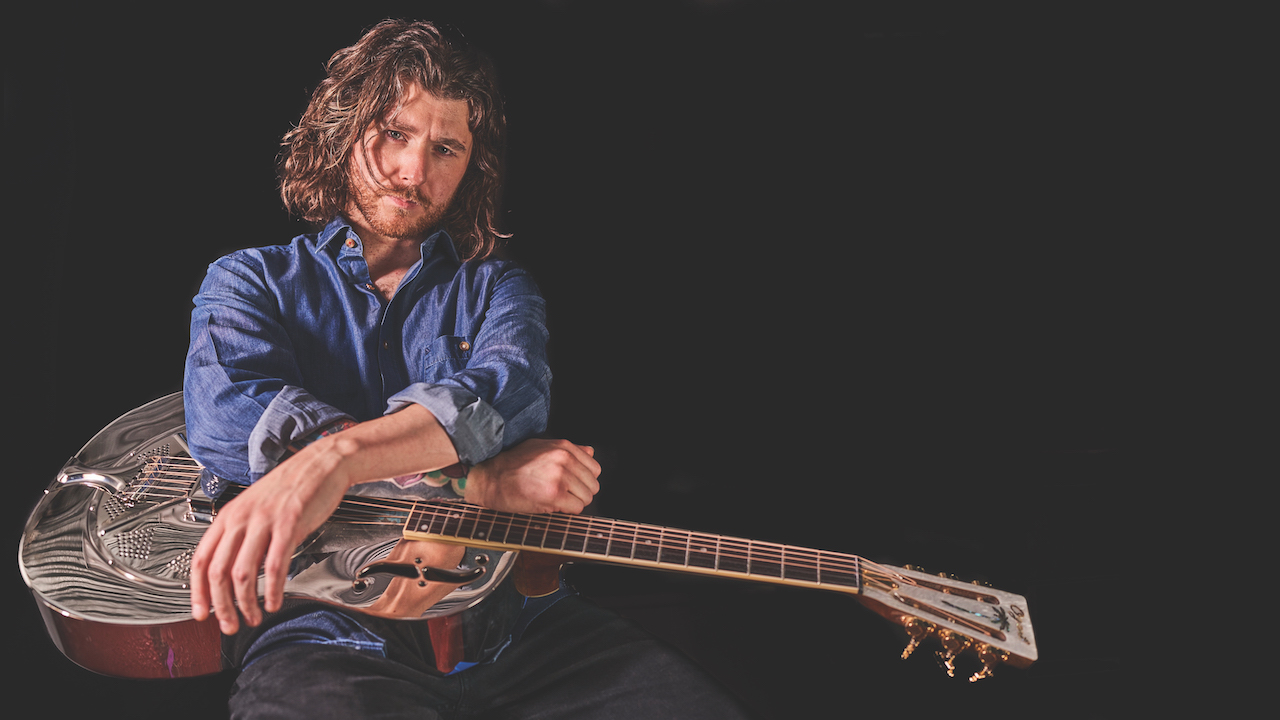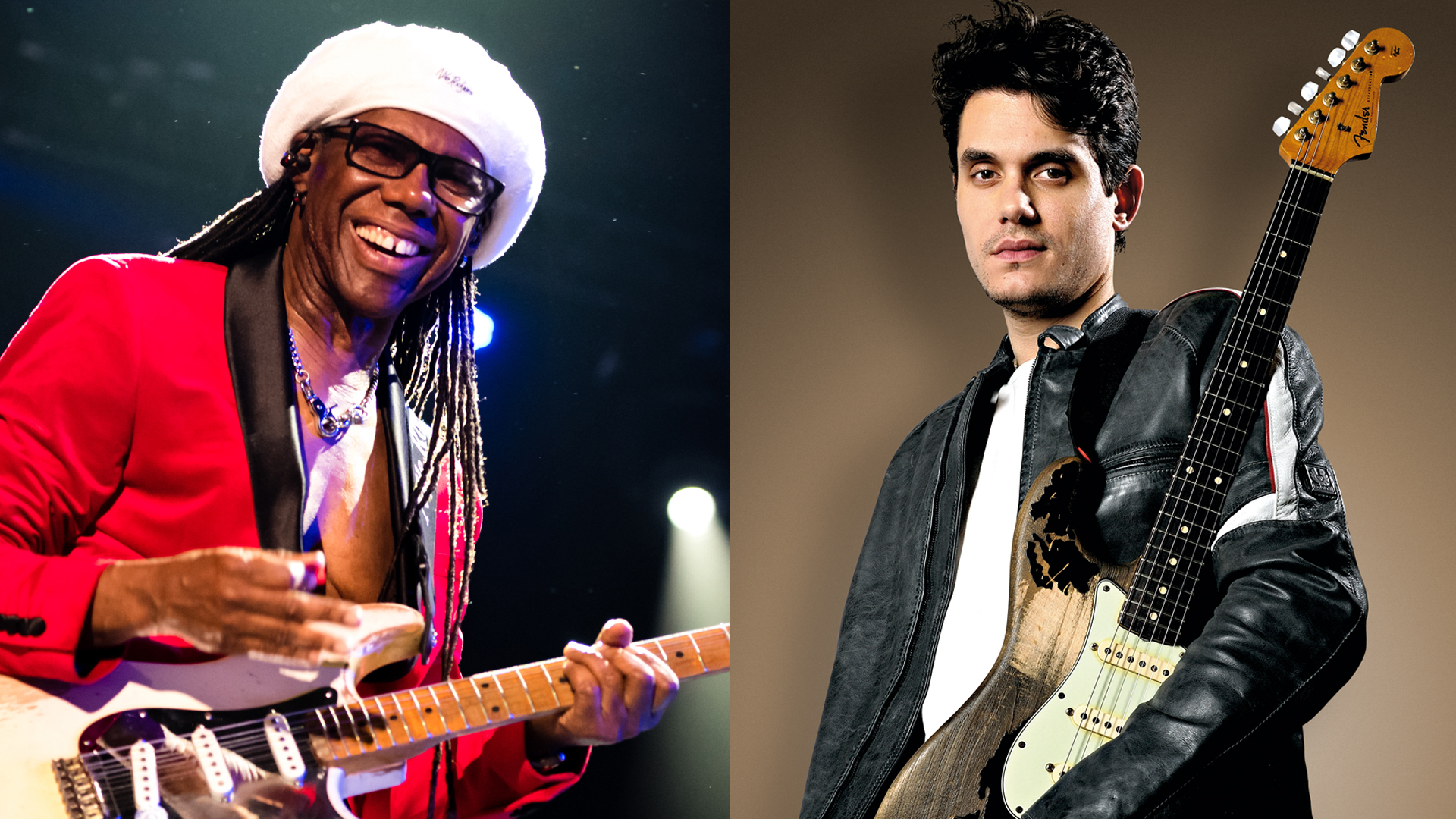“Guitar playing is a creative thing. If you come into it thinking that it’s a competition, you’re already screwed”: Rising U.K. blues guitarist Dom Martin on beating his inner demons and the ghost of Rory Gallagher
After four years of sobriety and a slew of acclaimed blues albums, Dom Martin hits his stride on Buried in the Hail

All the latest guitar news, interviews, lessons, reviews, deals and more, direct to your inbox!
You are now subscribed
Your newsletter sign-up was successful
Rising U.K. blues guitartist Dom Martin has seen more than enough darkness in his lifetime. While struggling with his own demons in his early 20s, he watched as his father — his guitar mentor and chief musical inspiration — succumbed to the ravages of alcoholism.
Martin has been kidnapped and beaten by thugs in Belfast, confident it would be his last stand. And his obsession with music has ruined most of his relationships with those brave enough to get close.
But with four years of sobriety under his belt and a trio of acclaimed blues albums to his credit, Martin is beginning to see the light.
“I have the capacity for change,” he says, speaking to Guitar Player from his home in Ireland. “And that’s strength, that’s resolve, that’s resilience. It took me a long time to realize that.”
Martin plays like a man determined on his third and latest album, Buried in the Hail (Forty Below Records), alternating between furious, fuzz-laden licks on “Unhinged” and country slide-blues straight out of northern Mississippi’s Hill Country on “Daylight I Will Find” and “Belfast Blues.”
His fretwork shines, particularly on the album’s quieter moments, while his fingerpicking shows the versatility of a committed guitar fanatic on the tracks “Hello in There” and “The Fall.”
“Music is the love of my life,” he says. “I get so much enjoyment from it now that I really don’t need anything else, and I’m willing to sacrifice everything for it.”
All the latest guitar news, interviews, lessons, reviews, deals and more, direct to your inbox!
With no question about his true north, Martin spoke with GP about his determination to make an album he could be proud of, the gear behind it, and how Rory Gallagher keeps popping into the frame.
You grew up playing the blues in Ireland. How did you come up on guitar and music?
My dad was a guitar player. He did pub gigs and club gigs, some session work. Very low-key. He was a very troubled man, but he was one of the best guitar players I’ve ever heard.
For me and my dad, it was always an outlet, a form of therapy, and I would encourage everybody to pick up an instrument because it really does unlock something that’s missing in a lot of people. It’s a creative thing. If you come into it with the intent that it’s a competition, you’re already screwed.
How did your father foster your interest in guitar?
I always was asking him to teach me this, teach me that — just getting him to show me as much as I could. He took me to see [U.K. folk guitarist] Ralph McTell when I was about 10 years old, at the Waterfront Hall in Belfast.
I realized just how good my dad was, because Ralph McTell’s a phenomenal guitar player — a really good fingerpicker and songwriter — and I realized that my dad was doing versions of his songs that Ralph McTell wouldn’t even be able to produce. My dad put more soul, life and heart into it.
On your earlier records, you mostly played a kind of Chicago-style electric blues, but you’ve really dug into country blues and slide playing since then.
This album is completely me. I didn’t let anybody compromise it whatsoever. I stuck to my guns on it the whole way through, from start to finish. I set the amps the way I wanted them set. I set the guitars up the way I needed them to be set up.
Even in the mixing process, I was on the phone to them, I was emailing them, saying, “Don’t touch this. Leave it alone. I don’t care what your thoughts are on it. I really couldn’t care less if it sounds like crap to you. To me, that’s what I want. And I’m sticking to that.”
One of the surprises on Buried in the Hail is how you turned the country standard “Crazy” into a minor-key blues dirge.
I was outta my mind when I came up with the chord structure for that, and I was struggling with the lyrics, but they just fit so well for the time that I found myself in when I was getting this album together.
I wrote the album in two days at a friend’s house in between tours, and the moment was just right. I had peace. I had quiet. I had all my equipment there in the van, and I set everything up and started writing, and I just flew. It was insane.
I didn’t think we were gonna get permission to do that song. I’m very proud of that, because I wouldn’t want to just copy and paste what Patsy Cline and Willie Nelson had done. I wanted those lyrics to feel like I wrote them and for the song to feel a little bit original.
As you mentioned, you took full control over the guitar tones this time. Where did you begin?
My Gibson ES-339, mostly. On most of the songs, that was the sound I wanted. The pickups are PAF types: ’59s [the Mule] from Bare Knuckle. After that, a place called House of Tone pickups sent me a set of their Peter Green PAFs [Tru PAFs].
I wish I’d have had them for the album, ’cause that’s the sound I needed. I was like, “Ah, if you had come to me a couple of months ago, that’s what would’ve been on that album!”
But it’s a great guitar. I can’t take it on tour, ’cause I’m scared of losing it or breaking it, so it’s only gonna be on that album and maybe the next one.
What amps and pedals do you pair those up with?
I love tweed amps, even the newer stuff. I’ve never really tried anything older than, like, the ’90s era. I started with a Peavey Classic 50, and I’ll never part with it — that was my first valve amp. After that, I sold a guitar for a Fender DeVille tweed. It has the bias pot. I’ve painted that red and I use it with a Marshall 4x12, and that’s the setup at the moment.
It’s alnico speakers — I’ve got two blues and one alnico cream in the 4x12, and some unidentifiable thing, but it sounds good. I use the same setup for acoustic that I do for electric, so there’s no need for a DI and different stuff.
I use a Flynn Amps Hawk boost, which is the Rory Gallagher signature pedal, and that goes into an overdrive pedal made for me by my amp tech. I have no idea what it is; I just like the sound it makes.
And then in the effects loop, there’s a lot of stuff I don’t need. It’s overkill for, like, 90 percent of the stuff I do, but I like it at home for ambience and just finding stuff for the fun of it.
Did Rory’s shadow loom large as a blues player in Ireland?
Yeah. I was on tour with Eric Gales last year, and Izzy Buholzer [of Gulfcaster Custom Guitars] got in touch in Florida. He said, “Dom, I wanna build you a guitar.” I said, “I have no money, but if I ever do, I’ll get back to you, ’cause I’ve got a great idea.”
He said, “Dom, you don’t understand. I’m gonna build you a guitar. I don’t want your money. I love what you do.” I said, “I always wanted to play a Strat, but I could never get along with them. Imagine Rory Gallagher’s Strat was always a Telecaster. That’s what I want.”
It took him a couple of days to get back to me, but he did it. The scary thing is, I was in Holland doing a gig for Rory’s birthday at a festival, and the guitar got stuck at customs. It turned up at my house on Rory’s birthday while I was playing in Holland for his birthday. I couldn’t believe it.
It’s a coincidence, but it’s like Rory’s trying to say hello or something.
Dom Martin's new album Buried in the Hail is available to buy or stream now
Jim Beaugez has written about music for Rolling Stone, Smithsonian, Guitar World, Guitar Player and many other publications. He created My Life in Five Riffs, a multimedia documentary series for Guitar Player that traces contemporary artists back to their sources of inspiration, and previously spent a decade in the musical instruments industry.





